

Social media and the Wall Street protests: #Occupytheweb. How Google Dominates Us by James Gleick. In the Plex: How Google Thinks, Works, and Shapes Our Lives by Steven Levy Simon and Schuster, 424 pp., $26.00 I’m Feeling Lucky: The Confessions of Google Employee Number 59 by Douglas Edwards Houghton Mifflin Harcourt, 416 pp., $27.00.
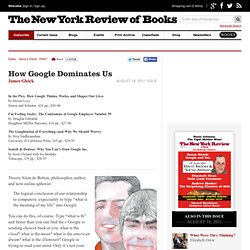
Wikileaks publishes documents on plan to curb free software in the European Union. Julian Assange - Wikileaks Yesterday, 10/09/2010 at 11:47 PM (UTC+1), this post started to receive a serie of comments, insults and offensive phrases that made me to moderate the site for first time.
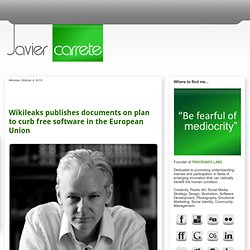
But not only insults: several of my email accounts and sites, were hacked and the comments system (disqus) also was hacked from USA, creating a new site using one of my emails. WikiLeaks is none of my business and all the information included in this post is public domain and leaked or published more than a year ago, it is not news. The document, published by Wikileaks (website), shows that Jonathan Zuck, president of the ACT (Association for Competitive Technology), an organization with strong ties to Microsoft, and founder of Americans for Technology Leadership, had influenced changes in working documents of the European Union.
You can find the changed source document at the end of this article. The document in question is a work project developed by experts from the European Commission. You Arent Blogging Yet?!? - The Scientist - Magazine of the Life Sciences. Exploring and Defining Influence: A New Study. InShare100 Influence is bliss…

The Web 2.0 Summit Points of Control Map. Piratage : nouvelle forme de propriété ou nouveau type de délit. Blog « Science Blogging Aggregated. 15 Jan.
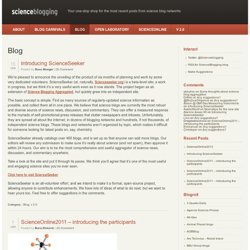
Instant. Google Instant is a search enhancement that shows results as you type.
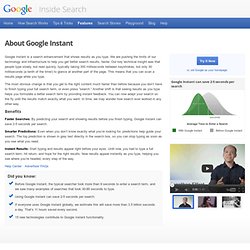
We are pushing the limits of our technology and infrastructure to help you get better search results, faster. Our key technical insight was that people type slowly, but read quickly, typically taking 300 milliseconds between keystrokes, but only 30 milliseconds (a tenth of the time!) To glance at another part of the page. This means that you can scan a results page while you type. Search: now faster than the speed of type. Search as you type.
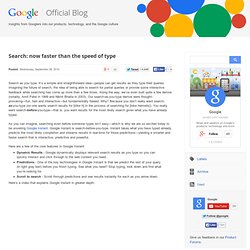
It’s a simple and straightforward idea—people can get results as they type their queries. Imagining the future of search, the idea of being able to search for partial queries or provide some interactive feedback while searching has come up more than a few times. Along the way, we’ve even built quite a few demos (notably, Amit Patel in 1999 and Nikhil Bhatla in 2003). Our search-as-you-type demos were thought-provoking—fun, fast and interactive—but fundamentally flawed. Network Visualization. Immersion by the MIT Media Lab is a view into your inbox that shows who you interact with via email over the years.
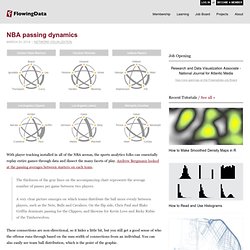
Immersion is an invitation to dive into the history of your email life in a platform that offers you the safety of knowing that you can always delete your data.Just like a cubist painting, Immersion presents users with a number of different perspectives of their email data. It provides a tool for self-reflection at a time where the zeitgeist is one of self-promotion.
It provides an artistic representation that exists only in the presence of the visitor. It helps explore privacy by showing users data that they have already shared with others. What's Wrong With 'X Is Dead' - Science and Tech. Technologies die violent deaths less often than we think.

This is the basic problem with the Chris Anderson-anchored Wired cover story, "The Web is Dead. " If you think about technology as a series of waves, each displacing the last, perhaps the rise of mobile apps would lead you to conclude that the browser-based web is a goner. But the browser-based web is not a goner. 4G mobile networks: From Russia with bandwidth. Nice things about the web. Comments on Net neutrality: No, these are special puppies. Flattr.com. Is Flattr the new Facebook Like, but this time with real money? Biggest broadband providers: China clicks. Op-Ed Contributor - Google’s Earth.
How to create an aggregated feed « Science Blogging Aggregated. AlphaWorks : Word-Cloud Generator : Overview. Net Neutrality. Mining social networks: Untangling the social web. TELECOMS operators naturally prize mobile-phone subscribers who spend a lot, but some thriftier customers, it turns out, are actually more valuable.
Known as “influencers”, these subscribers frequently persuade their friends, family and colleagues to follow them when they switch to a rival operator. The trick, then, is to identify such trendsetting subscribers and keep them on board with special discounts and promotions. People at the top of the office or social pecking order often receive quick callbacks, do not worry about calling other people late at night and tend to get more calls at times when social events are most often organised, such as Friday afternoons. Influential customers also reveal their clout by making long calls, while the calls they receive are generally short. The internet: The web's new walls. The Tragic Death of Practically Everything. Wired Editor in Chief Chris Anderson is catching flak for the magazine’s current cover story, which declares that the Web is dead.
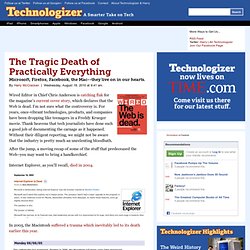
Upload & Share PowerPoint presentations and documents. Kickstarter. Polymaps. Postgenomic. Today’s UK Researchers: E-journals Dominate, Access Not an Issue, Skimming Increasing. The Research Information Network recently published a study evaluating the use and role of e-journals in UK researchers’ professional lives.

It builds on an earlier study of the computer logs of researchers in the UK by adding interviews, observations, and an online questionnaire so that the earlier findings could be placed in context. The study focused on researchers, not on practitioners or information consumers. This more tight-knit group always differs somewhat in their behaviors, being more voracious in their information consumption habits. The researchers who were studied came from a wide swath of fields — biological sciences, chemistry, environmental sciences, history, economics, and physics. This is a big problem with the study, actually. So, this is an interesting study of UK researchers, but nothing earth-shattering. The good news is that journals are more important in the professional lives of researchers than ever. There are plenty of other stimulating findings in this paper: Icons of the Web scaled by popularity.
Nmap visualizes site popularity as scaled icons. Favicons, that is. They're that little icon that shows in your address bar or when you bookmark a site in your browser. Techdirt. 6a00d8341d3df553ef013485bc7df1970c-pi (JPEG Image, 1750×2479 pixels) - Scaled (25. YouTube tries live video streaming - tech - 14 September 2010. IT'S one small step for YouTube, but it could be a giant leap for internet TV: this week, the firm began trialling live broadcasting. The website has occasionally offered live TV before – including US president Barack Obama's first State of the Union address – but using third-party technology. The two-day-long exercise was described as "an initial trial, a first step" by YouTube product manager Josh Siegel. Still, a study by internet marketing research company ComScore shows there's an appetite: last year there was a 648 per cent surge in the amount of time Americans devoted to watching live streamed video on other websites.
Google TV is also launching in the US in the next few weeks. It aims to integrate full web access and search features into home television packages. Academic reference management software for researchers. David McCandless: The beauty of data visualization. Gary Flake: is Pivot a turning point for web exploration?